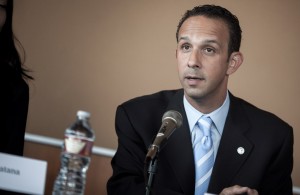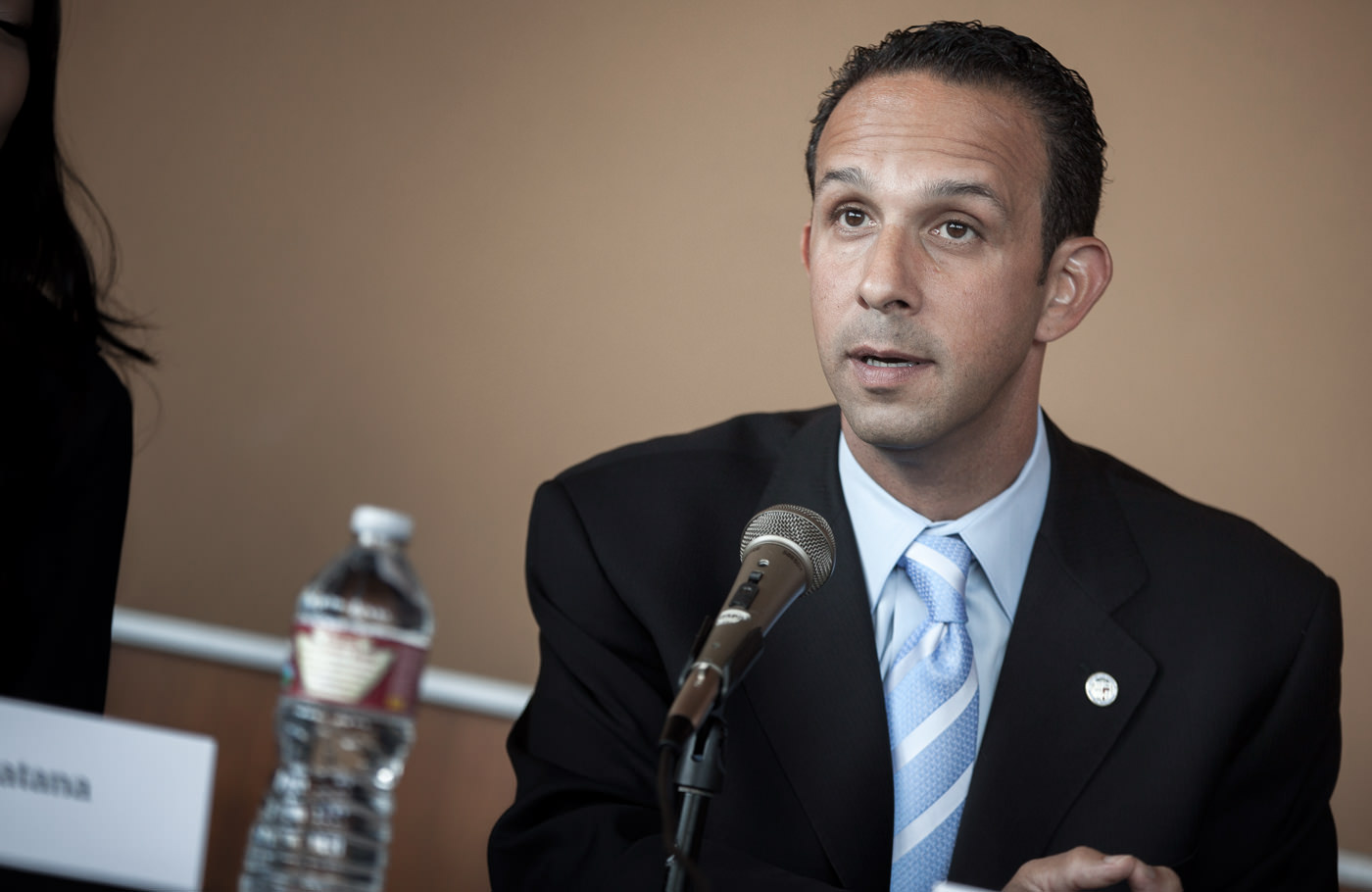Students Talk Back discusses job growth
The Jesse M. Unruh Institute of Politics continued its Students Talk Back series with a panel entitled “Good Jobs at Good Wages: Putting Los Angeles Back to Work” on Wednesday in the Ronald Tutor Campus Center.

Looking forward · Los Angeles City Councilman Mitchell Englander (R) District 12, expressed concerns about L.A.’s public school system and vocational training. – Ralf Cheung | Daily Trojan
The panel consisted of students Elena Kuhn of the College Democrats and Sarah Dhanaphatana of the College Republicans as well as L.A. City Councilmember Mitchell Englander of District 12 and South Park Business Improvement District Executive Director Jessica Lall. The discussion was co-moderated by Kerstyn Olson, director of the Unruh Institute, and Anshu Siripurapu, news editor of the Daily Trojan.
The panel opened with a discussion of the complex intergenerational issues associated with urban poverty. Several panelists mentioned the effect of educational opportunities on income disparity.
“We really are a divided city of haves and have nots, and it’s becoming more evident every day,” Englander said. “It’s about opportunities, and it’s about education. We have one of the worst school systems on earth [in Los Angeles] … Our children are dropping out at incredible rates, we’ve cut vocational training … those [programs] are gone, they’ve been decimated.”
Lall agreed, and went on to discuss poverty and education in Los Angeles in a larger context.
“Los Angeles ranks the highest in poverty of the seven largest metropolitan areas in the United States … 28 percent of Angelenos live below the poverty line, and if you don’t get a strong, solid education, your social mobility is limited drastically,” Lall said.
Englander mentioned that existing education issues had been compounded by the closure of vocational schools.
“LAUSD is seeing fewer than 2/3 of all K-12 students graduating high school, graduating with a diploma. Less than half of high school graduates from LAUSD are proficient in English.,” Dhanaphatana, who is also a staff writer for the Daily Trojan, said. “Students simply lack the skills to go beyond entry level jobs.”
Though these students would seek vocational training or attend trade schools, fewer students now receive vocational training.
The panel then moved from discussing systemic issues to discussing possible solutions. Lall suggested that a collaboration between automotive companies and trade schools could ensure that students were learning skills they would need on the job.
“Schools have to look at the skills that are needed by employers and then be nimble with their curriculum,” Lall said.
Englander agreed with the necessity of flexible curricula but said he believes that this is a micro solution to a macro problem. His plan was more ambitious.
“It starts with three words: Break up LAUSD. It’s too big and will never change if we don’t break it up,” Englander said.
While panelists agreed on the complexity and importance of questions of economic disparity, they were also quick to defend their respective party’s ideological stances on the issues when prompted.
“Democrats and Republicans have very distinct views on income inequality,” Dhanaphatana said. “Democrats believe that liberty is immoral unless it brings equality … but I think Republicans realize that inequality will always exist.”
Kuhn disagreed.
“The way I see it is an issue of equity versus efficiency,” Kuhn said. “The equity is that we need to pay workers a living wage based on the work that they’re doing in order to be contributive members of society, whereas Republicans are more concerned with efficiency which would be capitalist profit.”
Everyone was quick to agree, however, that these ideological differences are hard to work around and have created an inefficient legislature.
“I think [the gridlock is] criminal in this country … there are no bipartisan relationships in D.C.,” Englander said, as other panelists nodded in agreement.
Raising the minimum wage was another unanimously agreed upon tactic for combatting poverty and putting Angelenos back to work. Englander and Lall, however, raised some doubts on how this may work in Los Angeles.
“I believe that we should increase the minimum wage, but I’m not sure we should do it as a city,” said Englander, who was worried that raising the minimum wage may drive business out of Los Angeles, which he described as already being a “business unfriendly city.”
Lall echoed his sentiments.
“Should there be a living wage? Yes. But should there also be a business-tax cut to keep businesses here in L.A.? Yes. You need both for a prosperous city,” she said. “When you talk about the minimum wage in a vacuum it’s really dangerous … If you don’t have other reforms you’re just moving the problem to another part of the board.”
UPDATE (10/23 11:50 a.m. ): This article has been updated to amend an error wherein Sarah Dhanaphatana was misquoted as saying fewer than 2/3 of Angelenos graduate as proficient in English. The correct quote is as it appears in the article currently.

